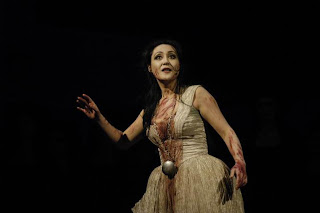What Lucia di Lammermoor has to say to us
I have watched today Gaetano Donizetti's Lucia di Lammermoor at the Opera house La Monnaie in Brussels. I cried like a child, also because I had a person in mind, I hold an unhappy love for someone, therefore I am very sensitive to this kind of topics. Even if the difference is that Lucia's love is corresponded but oppsed by her brother, whereas my love is not corresponded. Whatever.
Lucia is the sister of a Scottish noble, who wants to marry her to a perspective political ally; but she loves Edgardo, and before he must temporarily leave for France, they promise fidelity one to the other. Letters of Edgardo are destroied by Lucia's brother, and a false letter, which states that Edgardo has married another woman, is also fabricated, to inuce Lucia to renegate her love and marry the politician. She so does. But before being possessed by this man, having seed Edgardo abruptly arrive at the wedding, she kills her husbard and becomes folly, then she kills herself. Edgardo sees her about to die, and follows her in death.

I found this opera interesting for a series of reasons.
First, it teaches that repression brings to heavier and greater consequencies. Repression cannot cancel an istinct, it can just make it work and turn it sour, thus contributing to its later explosion.
secondly, it gives an idea of how disapproval and, broadly, reputation, especially sense of duty, can be manipulated to make one person substantially abdicate his inviolable rights. Lucia does not want to marry the politician, no-no. And until she declares her will, nobody can really do anything with that. But the sense of duty (help you brother!), the disapproval (your dead mother would be happy if you do that!) and the reputation (hey, Edgardo is a jerk!) are played against her to induce her to consent. This done, she bears all the responsibility for this act, because it was her who abdicated. Therefore, what first was just formal (the acceptance of the marriage) now becomes substantial (she is despised by Edgardo later, as unfaithful). Nobody should take permission to manipulate somebody's will, and nobody should let his will curbed by argumentation based on pride, reputation, raison d'Etat and so on. Because he is going to bear the bad consequences for that, for real!
Thirdly, the role of religion - controlling rage, but also curbing the will, opium for the people. This appears really well in the drama. The arcibishop lastly convince Lucia to accept the marriage, playing with her pride; he gratulates her for her sacrifice, which Heaven will appreciate, he discourages Edgardo to kill people at the wedding, he pushes him out of the wedding room, he finally, after having done all that, deprecates the homicide committed by Lucia as an orrible act, prays when she is dieing, and recommends to the dieing Edgardo to "think to Heaven". Disgusting!

Finally, it teaches how stupid people can be, just being violent, and not listening. Inaction is also a crime, and compliance against oneself as a crime. Miscommunication is the cause of many many deeds.
Peace.



Commenti
Posta un commento